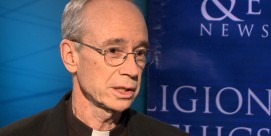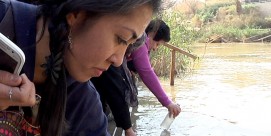In This Episode << SLIDE LEFT TO SEE ADDITIONAL SEGMENTS
Keeping the Sabbath
JUDY VALENTE, correspondent: There was a time in America when Sundays meant a day for worship, for leisure, for spending time with family and friends.
But that was before the advent of round-the-clock shopping, cell phones, and email that place us on call 24 hours a day.
REV. MARYANN MCKIBBEN DANA: People are feeling the burden and the pressure of a fast-paced world and wanting to find some alternatives, a new rhythm of being, and how Sabbath is part of that conversation.
VALENTE: It’s an idea as old as the Bible, recorded in the book of Exodus—one of the Ten Commandments, in which God is said to have told Moses, “Remember the Sabbath, to keep it holy. In it thou shalt not do any work.”
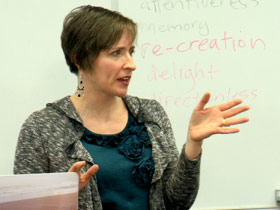
MCKIBBEN DANA: We’ll take a few minutes to share, tell the people at your table about that and why it creates Sabbath for you, or why it helps make Sabbath happen for you.
VALENTE: Now, a growing number of pastors is trying to help people reclaim at least one day of the week for Sabbath, time set aside for spiritual, mental and physical renewal—whether it’s Sunday or even another day. It’s been described as “the most precious present mankind has received from the treasure house of God.”
These clergy members are here to explore realistic ways that people can observe the Sabbath despite all of the distractions and interruptions families face on a day that’s supposed to be “holy time.”
MCKIBBEN DANA: Sabbath is the great leveler. I mean, if we take that seriously as a culture, it means that no matter what your life situation, whether you are Bill Gates or the person who cleans Bill Gates’ office, you have an inherent dignity and for a time each week, you do not need to defend your existence. To prove your worth in the culture and the marketplace.
Male workshop participant: There is a sense of, boy, I’m important, I’ve got 35 emails and 10 text messages today.
Female workshop participant: God didn’t say, “Gee, you should take a day off.” God said, “Remember the Sabbath and keep it holy.” Oh, take a day, sure, take a day. No, it was, “Do this, this is my commandment.”
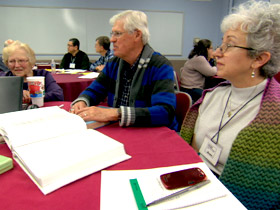
MCKIBBEN DANA: We can think about it in a very fixed way, that it’s one day where we don’t do any work. But we can also think about Sabbath in, I think, a lot of different ways and I think we can help our parishioners think about Sabbath in a different way.
VALENTE: MaryAnn McKibben Dana, a Presbyterian minister from Springfield, Virginia, chronicled her own family’s struggle to set aside one day a week in a book called “Sabbath in the Suburbs: A Family’s Experiment with Holy Time.” Now she leads workshops across the country, trying to help others find some Sabbath time during each week.
MCKIBBEN DANA: We all left things undone to be here. Let it be. I also find this a helpful way to start my Sabbath, is to say, “What has been done has been done, what has not been done has not been done. Let it be.”
VALENTE: McKibben Dana was working full-time as a pastor and pregnant with her third child when she decided something in her hectic life had to change. She and her husband vowed to set aside one day of the week when they didn’t work, run errands, shop or return emails.
MCKIBBEN DANA: People ask us, “How did you do that? How did you even make that work?” Well, people do this, you know. I mean the Jewish tradition still has a very strong component of Sabbath keeping to it.
VALENTE: But it wasn’t easy. Because McKibben Dana is a pastor and has duties on Sunday, she and her family decided to observe their Sabbath on Saturdays.
Son: (playing Jenga): And then I knock it down!
MCKIBBEN DANA: (to son) No, that’s not how you play the game…
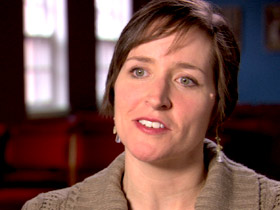
MCKIBBEN DANA: We realized that in our own faith we really have a resource in the Sabbath as an invitation from God, a command from God, to say, one time a week you set all that aside and you just enjoy one another and you enjoy God.
We don’t have to be anywhere, and they love to hear that. They call it, they call it the Sabbath but they also call it the “stay at home day.”
We’ll light a candle to sort of remind ourselves that this is a time set apart and we don’t make a big deal out of that. We just have it there. We also may have music playing in the background which puts us in a different kind of frame of mind.
VALENTE: The giant TV screen in the basement remains mute. The computer is turned off. The family doesn’t use the phone to make calls, but it will accept calls from friends.
MCKIBBEN DANA: Just being in conversation with our loved ones is a way to get in touch with the sacred part of life and so with the right intention and the right attention I think we can really see how God encounters us in all aspects of our lives.
The church is really called I think to be a counter-cultural voice, to say, you are enough, you do enough, there is a time each week where you can just stop.

If you let yourself try it and enter into it however you can with a couple of hours or a half of day, you will see a change over the course of your practice of doing it.
(to daughter): I wonder if Margaret and Caroline can get out the ingredients that are listed there. Okay?
VALENTE: McKibben Dana stresses that observing Sabbath doesn’t mean doing only things that seem traditionally religious or holy, but making “holy” the acts of ordinary life.
MCKIBBEN DANA: (to son) We’ll put these in the oven and then we’ll make lunch.
(singing at table) For help and strength and daily food we give you thanks, O Lord…
MCKIBBEN DANA: For some people the idea of taking off an entire day either feels overwhelming, or it really is logistically impossible, and so I tell people to start where you are. A lot of us don’t have an entire day at our disposal but we might have one morning on the weekend.
(to daughter) Oh, I see ducks in the water…
MCKIBBEN DANA: We love physical activity as part of our Sabbath. We love going to the state park near our house and we’ve been able to see the changing of the seasons and having the time on Sabbath to do that has really been very special for our family.
Psalm 90 is one of those beautiful psalms about time. And the passage of time. The psalmist says, “Teach us to count our days, that we might have a wise heart.” And I think that’s something that the Sabbath helps us to do, to be mindful about the passage of time.
Sabbath helps us count our days, and make them count. And not just be about doing and producing and more, more, more, but to be content and to appreciate the gift and the beauty of this day that we have.
VALENTE: And perhaps reclaim something from Scripture, which says that on the seventh day, even God rested. For Religion & Ethics NewsWeekly, this is Judy Valente reporting.
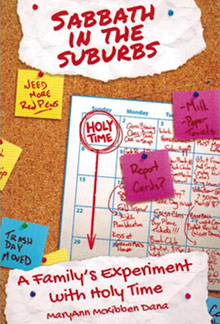
EXCERPT: SABBATH IN THE SUBURBS
Read excerpts from “Sabbath in the Suburbs: A Family’s Experiment with Holy Time” (Chalice Press, 2012) by MaryAnn McKibben Dana:
I have to think that Sabbath is worth the struggle. The victory is in showing up and making oneself available. Just as [my husband] and I make ourselves available to one another, having at least a short conversation each night before sleep claims us. Jus t as I seek to be present with my kids, not because every moment will feel holy and blessed but because holy and blessed moments don’t happen unless I am present.
“There are some things that spontaneity simply cannot offer,” Blu Greenberg writes about the ritualistic aspect of Shabbat. “[Sabbath] provides a steadiness and stability which … at best, creates the possibility of investing time with special meaning, experience with special value, and life with a moment of transcendence.” And so we will keep showing up to each other—and to Sabbath.
![]()
I wish for everyone to have a satisfying job and a living wage. At the same time, I wonder whether the current economic crisis in our country is a wake-up call. Infinite growth and consumption ins the trajectory we’ve been on as a culture, and it’s unsustainable. Is there a simpler, more viable way to live? Does Sabbath provide a small portal through which we glimpse a better world?
![]()
Meister Eckhart, a Christian mystic and philosopher from the fourteenth century, said that the spiritual life is a process of subtraction. Similarly, Henri Nouwen characterized the Christian life as a steady progress of downward mobility. Humility and simplicity are the signs of a life in Christ. As I begin to say “no” more often, I wonder if Sabbath might be winnowing my life into something more vital.
![]()
This whole Sabbath experiment, when I get down to it, is a reaction to the inevitability of death. I’ve often thought about Sabbath from the point of view of a parent—it’s an attempt to savor the time we have with our children while they are small, to not be so distracted by the busyness of life that we forget to live. But I also experience Sabbath as a daughter whose father died way too soon. Our time is short on this earth. Rabbi Abraham Joshua Heschel expresses as much with devastating clarity: “Time to us is sarcasm, a slick treacherous monster with a jaw like a furnace incinerating every moment of our lives. … Sabbath doesn’t solve this scarcity of time, of course. But it does give me hope that, by setting aside time for holiness to happen, it can and will. And I’ll be awake enough to perceive it when it does.
From “Sabbath in the Suburbs: A Family’s Experiment with Holy Time” by MaryAnn McKibben Dana (Chalice Press, 2012)



